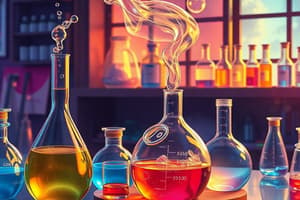Podcast
Questions and Answers
What is the main characteristic of crystalline solids?
What is the main characteristic of crystalline solids?
- Amorphous structure and variable shape
- High melting and boiling points
- Rigidity and incompressibility (correct)
- Fixed shape and fluidity
What is the unit of concentration that represents the number of moles of solute per liter of solution?
What is the unit of concentration that represents the number of moles of solute per liter of solution?
- Parts per million (ppm)
- Normality (N)
- Percentage by volume
- Molarity (M) (correct)
What is the type of electrode that does not participate in the electrochemical reaction?
What is the type of electrode that does not participate in the electrochemical reaction?
- Cathode
- Inert electrode (correct)
- Active electrode
- Anode
What is the order of reaction in which the rate of reaction is proportional to the square of the concentration of the reactant?
What is the order of reaction in which the rate of reaction is proportional to the square of the concentration of the reactant?
What is the type of adsorption in which the molecules are held by weak intermolecular forces?
What is the type of adsorption in which the molecules are held by weak intermolecular forces?
What is the group of elements that includes nitrogen, phosphorus, and arsenic?
What is the group of elements that includes nitrogen, phosphorus, and arsenic?
Study Notes
Chemistry Chapters in CUET Class 12
Solid State
- Types of solids: amorphous, crystalline, and polymorphic
- Characteristics of solids: rigidity, incompressibility, and fixed shape
- Types of lattice structures: primitive, face-centered, and body-centered
- Calculation of number of atoms per unit cell
Solutions
- Types of solutions: gaseous, liquid, and solid
- Concentration units: percentage, parts per million, and molarity
- Solubility: factors affecting solubility, solubility curves, and solubility product
- Colligative properties: boiling point elevation, freezing point depression, and osmotic pressure
Electrochemistry
- Electrochemical cells: galvanic and electrolytic cells
- Electrodes: anode, cathode, and inert electrodes
- Electrolysis: Faraday's laws of electrolysis and applications
- Galvanic cells: Daniell cell, Leclanche cell, and lead-acid battery
Chemical Kinetics
- Rate of reaction: factors affecting rate, rate law, and rate constant
- Order of reaction: first order, second order, and zero order
- Molecularity: unimolecular, bimolecular, and trimolecular reactions
- Catalysis: homogeneous and heterogeneous catalysts
Surface Chemistry
- Adsorption: physisorption and chemisorption
- Types of adsorption: physical and chemical adsorption
- Factors affecting adsorption: surface area, temperature, and pressure
- Catalysis: surface area, active centers, and promoters
General Principles and Processes of Isolation of Elements
- Occurrence of metals: native, ores, and minerals
- Extraction of metals: pyrometallurgy, hydrometallurgy, and electrometallurgy
- Refining of metals: distillation, electrolysis, and zone refining
- Extraction of non-metals: nitrogen, oxygen, and chlorine
p-Block Elements
- Group 15: nitrogen, phosphorus, and arsenic
- Group 16: oxygen, sulfur, and selenium
- Group 17: halogens and their compounds
- Group 18: noble gases and their compounds
d-Block and f-Block Elements
- Transition metals: general characteristics, oxidation states, and complexes
- Lanthanides and actinides: characteristics, oxidation states, and complexes
- Coordination compounds: Werner's theory, isomerism, and bonding
Studying That Suits You
Use AI to generate personalized quizzes and flashcards to suit your learning preferences.
Description
Test your knowledge of solid states, solutions, electrochemistry, chemical kinetics, surface chemistry, and p-block and d-block elements in this comprehensive chemistry quiz covering all the important chapters of CUET Class 12 Chemistry.




